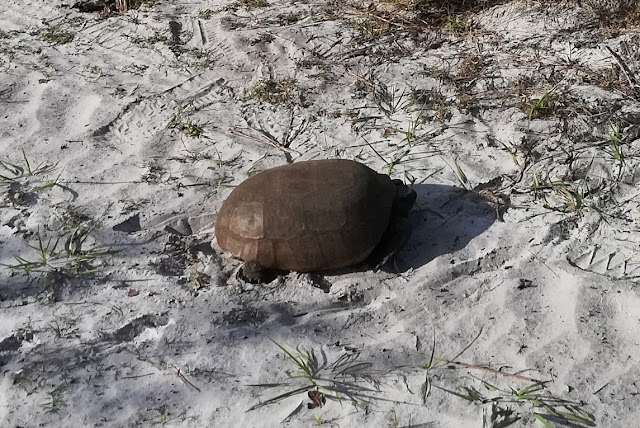Any corrections to the identification of the species are always welcome. I do not pretend to be an expert at it.
It's quite interesting to hike and see the various habitats in central and southern Florida.
In addition to the hardwood hammocks which contain broadleaved trees, the most common ecosystem I've seen are the mesic pine and scrubby flatwoods, as well as the pine sandhills, which contain various dominant grasses.
 |
| Shrub and Scrub understory at Oscar Scherer State Park |
When I hiked, one of the most common understory denizens of these ecosystems were the very distinctive Saw Palmetto (Serenoa repens), which forms the shrubby layer below the taller pines and Sabal palmetto.
 |
| Grasses at Oscar Scherer State Park |
But there were also vast areas covered with various grasses in these ecosystems, and it was quite amazing to see them waving in the wind below the tall stately pines and Sabal palms. Although there were smaller stands of grasses in area with a denser canopy, the really large stands occurred when the canopy was more open.
 |
| Andropogon along the path at Ocala National Forest |
One of the more distinctive species I saw while hiking was Aristida beyrichiana (wiregrass), which is one of the common denizens of these sandhills and flatwoods. This species is a major component of the ecosystem and is so reliant on fire in that it only produces viable seeds when a fire goes through the area during the growing season.
 |
| A. beyrichiana at Ocala National Forest |
 |
| A. virginicus at Ocala National Forest |
Another Andropogon that looks somewhat similar, although with much thicker and profuse seedheads was Andropogon glomeratus, although some botanists consider this to be a subspecies of A. virginicus.
 |
| A. glomeratus |
In addition to the major native grasses, I also stumbled on a few pockets of Imperata cylindrica (cogon grass), which is usually treated when found by workers in the parks.
 |
| I. cylindrica (Cogon grass) at Oscar Scherer State Park (straight blades in foreground) |
 |
| I. cylindrica (Cogon grass) at Ocala National Forest Campsite (in foreground) |
At Ocala National Forest, I found spreading clusters near the area reserved for camping, where it looked to be slowly muscling aside the other understory vegetation.
I also saw some interesting animal species during my hikes. One of the most memorable was when I accidentally bumped into a Gopher Tortoise that was crossing the trail at Oscar Scherer State Park. My wife had passed by a few minutes earlier, and the tortoise must have thought it was safe to cross the road, not knowing that I was lagging behind her (taking pics of everything).
 |
| Grasses flank the trail at the Disney Nature Preserve |
It withdrew into its shell and would not come out until I had moved far away from it, whereupon it continued to trundle to the opposite side of the road, perhaps muttering about the inconsiderate humans that share its world.
 |
| Grass understory at Ocala National Forest |


No comments:
Post a Comment